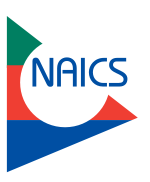- North American Industry Classification System
-
The North American Industry Classification System or NAICS (pronounced "nakes"[1]) is used by business and government to classify business establishments according to type of economic activity (process of production) in Canada, Mexico and the United States. It has largely replaced the older Standard Industrial Classification (SIC) system; however, certain government departments and agencies, such as the U.S. Securities and Exchange Commission (SEC), still use the SIC codes.
An establishment is typically a single physical location, though administratively distinct operations at a single location may be treated as distinct establishments. Each establishment is classified to an industry according to the primary business activity taking place there. NAICS does not offer guidance on the classification of enterprises (companies) which are composed of multiple establishments.
Contents
Codes
The NAICS numbering system employs six-digit code at the most detailed industry level. The first five digits are generally (although not always strictly) the same in all three countries. The last digit designates national industries. The first two digits designate the largest business sector, the third digit designates the subsector, the fourth digit designates the industry group, and the fifth digit designates particular industries.
History
NAICS is a collaborative effort by Mexico’s Instituto Nacional de Estadística, Geografía Informática (INEGI), Statistics Canada, and the United States Office of Management and Budget (OMB), through its Economic Classification Policy Committee (ECPC), staffed by the Bureau of Economic Analysis (BEA), the Bureau of Labor Statistics (BLS), and the Census Bureau. The system is designed to be largely compatible with the United Nations Statistical Office's International Standard Industrial Classification System (ISIC). Versions are released every five years.
With the first version, released in 1997, NAICS offered enhanced coverage of the service sector, relative to SIC. The 2002 revision accommodated significant changes in the Information Sector. The upcoming revision in 2012 will address classification challenges stemming from factoryless production.[2]
NAICS 2007 sectors
Sector number Description 11 Agriculture, Forestry, Fishing and Hunting 21 Mining 22 Utilities 23 Construction 31-33 Manufacturing 42 Wholesale Trade 44-45 Retail Trade 48-49 Transportation and Warehousing 51 Information 52 Finance and Insurance 53 Real Estate and Rental and Leasing 54 Professional, Scientific, and Technical Services 55 Management of Companies and Enterprises 56 Administrative and Support and Waste Management and Remediation Services 61 Education Services 62 Health Care and Social Assistance 71 Arts, Entertainment, and Recreation 72 Accommodation and Food Services 81 Other Services (except Public Administration) 92 Public Administration Bibliography
- North American Industry Classification System (NAICS): Executive Office of the President Office of Management and Budget; Jist Works; (January 1999); ISBN 1-56370-537-0
- Harris' Complete Guide to NAICS by Scott M. Vogel; Harris Infosource; (September 19, 2001); ISBN 1-55600-922-4
- NAICS Desk Reference, Jist Works, U. S. Census Bureau; JIST Publishing; (July 2000); ISBN 1-56370-694-6
See also
- NAPCS
- Global Industry Classification Standard
- Industry information
External links
- NAICS Definitions at US Census Bureau
- National Technical Information Service
- SICCODE.com - SIC/NAICS Business Directory
Analogies in other countries
Categories:- Industrial classifications
- Industry
Wikimedia Foundation. 2010.

